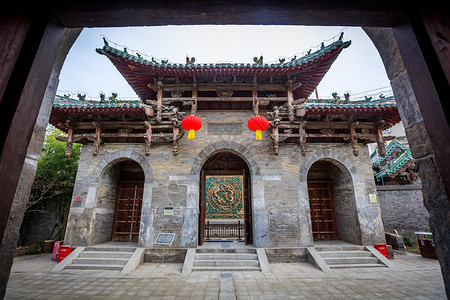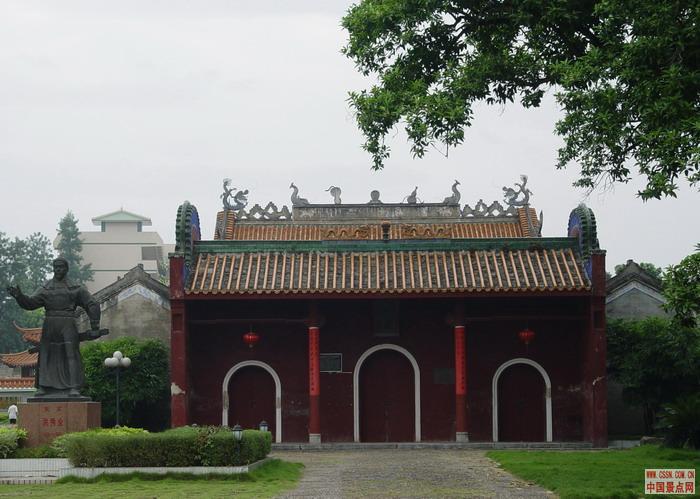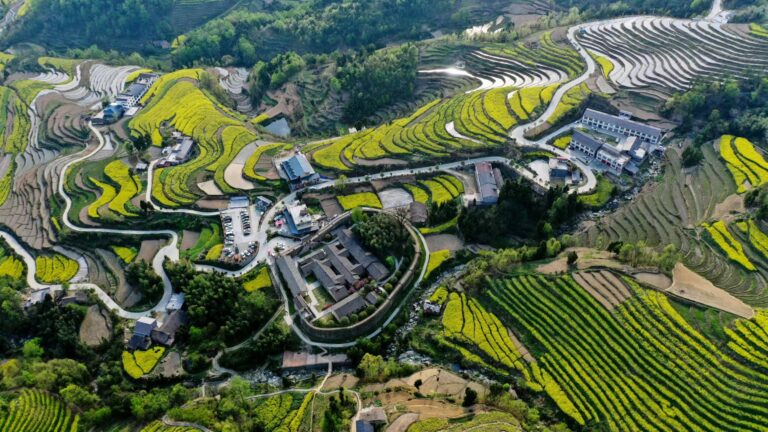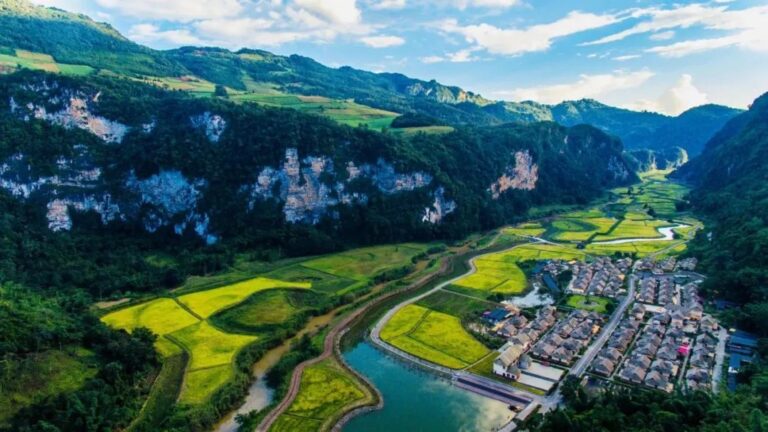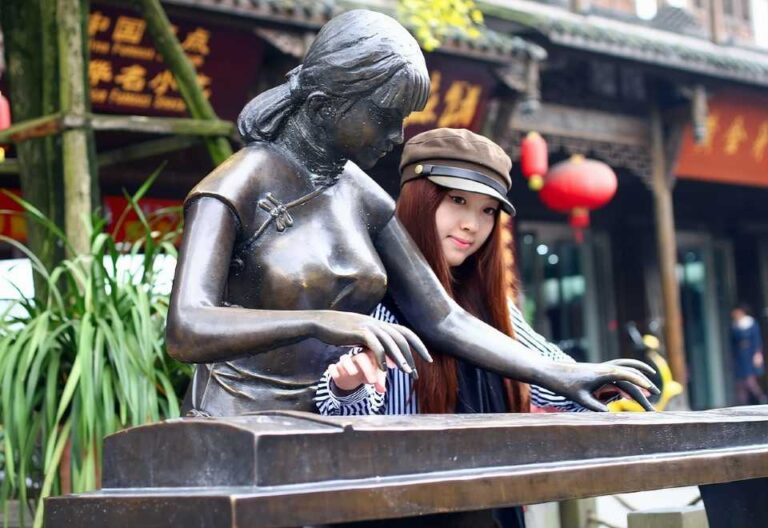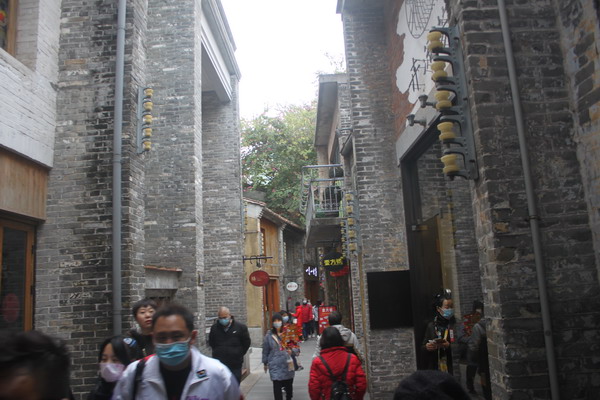Discovering Chizhou Jiuhuashan Baisuigong: The Heart of Anhui’s Natural Wonders
An Essential Guide to Visiting Chizhou Jiuhuashan Baisuigong
In This Guide
- An Essential Guide to Visiting Chizhou Jiuhuashan Baisuigong
- The Rich History of Chizhou Jiuhuashan Baisuigong
- Main Highlights: What to See at Chizhou Jiuhuashan Baisuigong
- Planning Your Visit: A Practical Guide
- Tickets, Hours, and Booking
- How to Get There
- Local Cuisine and Accommodation
- Frequently Asked Questions
- Final Thoughts on Your Trip
Nestled in the serene landscapes of Anhui Province, Chizhou Jiuhuashan Baisuigong, or the Baisui Palace, is a remarkable gem within the famed Jiuhua Mountain, one of China’s four sacred Buddhist mountains. This awe-inspiring site not only serves as a spiritual haven but also as an architectural marvel steeped in rich history and cultural significance.
Established during the Ming Dynasty, Baisuigong is dedicated to the revered monk Wuxia, who achieved remarkable longevity, reportedly living to the age of 126. The palace houses his incorruptible remains, drawing countless pilgrims and curious travelers alike, eager to witness the extraordinary preservation and to seek blessings for longevity and health. The palatial structure, elegantly built into the mountainside, offers breathtaking views of the surrounding natural beauty, creating a perfect backdrop for reflection and spiritual contemplation.
Visiting Baisuigong provides more than just a glimpse into ancient Buddhist practices; it is an immersive journey through a landscape where spirituality intertwines with nature. As you wander through the intricate halls adorned with historical artifacts, you will feel the palpable energy of devotion that has echoed through the centuries. Whether you are a devoted follower of Buddhism or simply a traveler searching for tranquility amidst stunning scenery, Baisuigong promises an experience that resonates deep within the soul.
Prepare to embark on an unforgettable journey of discovery, where the peaceful ambiance and majestic views of Jiuhuashan await to inspire and rejuvenate your spirit.
The Rich History of Chizhou Jiuhuashan Baisuigong
The history of Chizhou Jiuhuashan Baisuigong, or the Baisui Palace, is deeply entwined with the rich tapestry of Chinese Buddhist culture and the legendary tales of its revered figures. Established during the Ming Dynasty, this temple is one of the four major monasteries on Jiuhua Mountain, which is renowned as a sacred site of Ksitigarbha Bodhisattva, a bodhisattva associated with the afterlife and the salvation of souls.
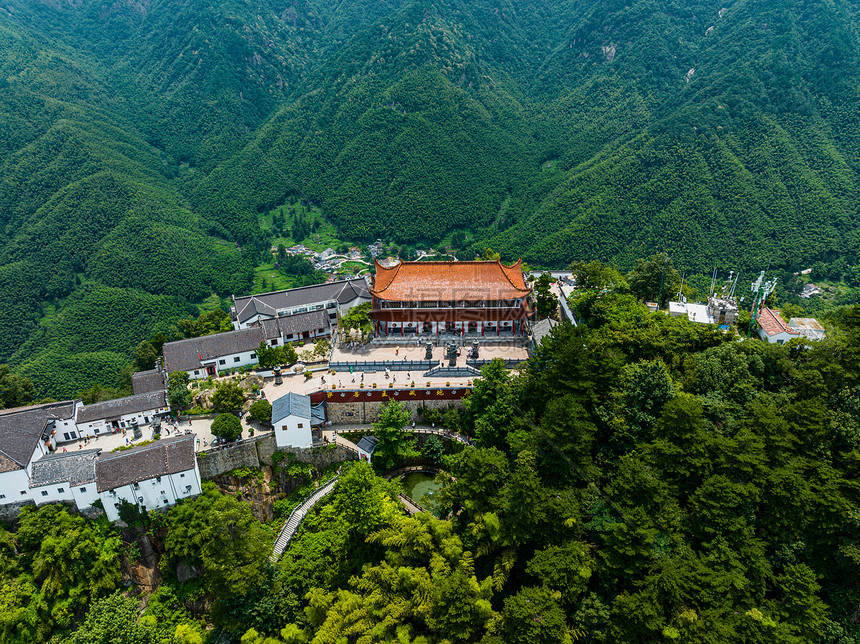
Chizhou Jiuhuashan Baisuigong.
The Baisui Palace is particularly notable for housing the remains of the eminent monk Wu Xia, who is said to have lived to the remarkable age of 126. Originally hailing from Hebei, Wu Xia traveled extensively, undertaking pilgrimages to other sacred mountains like Wutai and Emei, before settling in this tranquil haven for spiritual practice. His life and teachings left an indelible mark on the local Buddhist community, and after his passing, his body reportedly remained intact and uncorrupted—a phenomenon that has drawn countless pilgrims and visitors over the centuries.
In the early 17th century, during the reign of the Ming Emperor Chongzhen, Wu Xia was posthumously honored as the “Incarnate Bodhisattva,” further solidifying his legacy within the Buddhist tradition. This recognition not only enhanced the temple’s stature but also attracted a significant influx of devotees, contributing to the temple’s enduring religious significance.
The architectural style of Baisui Palace reflects the traditional designs of Ming-era temples, with its structures harmoniously integrated into the mountainous landscape. Visitors to the palace can admire the serene environment, which is enhanced by its location amidst the breathtaking natural scenery of Jiuhuashan. The palace serves not only as a place of worship but also as a cultural repository, preserving numerous invaluable Buddhist artifacts and texts.
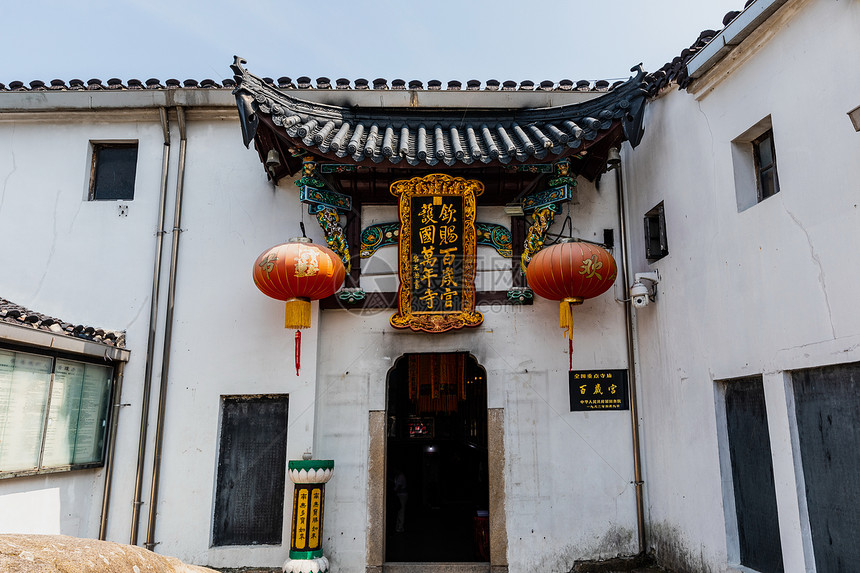
Chizhou Jiuhuashan Baisuigong.
Today, Baisui Palace stands as a testament to the rich spiritual heritage of Jiuhua Mountain, drawing visitors from around the world who seek both enlightenment and the beauty of its natural surroundings. It remains a vital part of the pilgrimage routes for those following in the footsteps of Wu Xia and many other Buddhist practitioners who have sought solace and wisdom within its sacred walls.
Main Highlights: What to See at Chizhou Jiuhuashan Baisuigong
Nestled in the picturesque landscape of Chizhou, Anhui Province, Baisuigong (百岁宫), or the Hundred Years Palace, stands as a remarkable testament to China’s rich Buddhist heritage and architectural beauty. This sacred site is particularly renowned for its association with the legendary monk, Wu Xia, who is said to have lived for 126 years, drawing visitors seeking both spiritual enlightenment and historical intrigue.
Architectural Marvel
Constructed during the Ming Dynasty, Baisuigong showcases a unique architectural style that harmonizes with the mountainous terrain of Jiuhua Mountain. The palace is designed with intricate details, incorporating traditional Chinese aesthetics that reflect the era’s craftsmanship. The serene environment, combined with the palace’s majestic structure, creates an atmosphere conducive to contemplation and reflection.
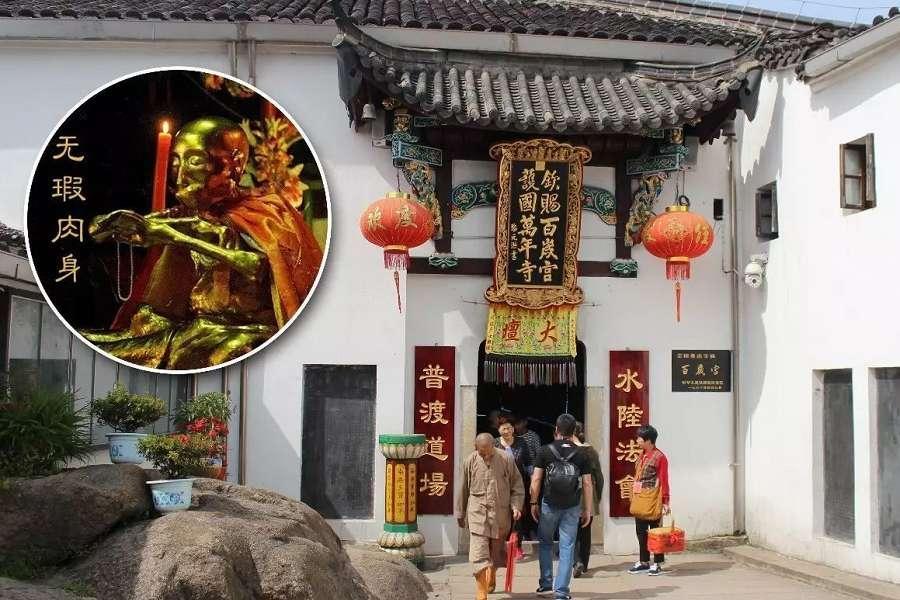
Chizhou Jiuhuashan Baisuigong.
Historical Significance
At the heart of Baisuigong is the revered body of Wu Xia, a monk whose remains have astonishingly remained intact for centuries. This phenomenon has attracted countless pilgrims and tourists alike, who come to pay their respects and explore the rich history of the site. Baisuigong is considered a vital part of Jiuhua Mountain’s spiritual landscape, which is one of China’s four sacred Buddhist mountains.
Scenic Views
Visitors to Baisuigong are treated to breathtaking views of the surrounding mountains and valleys. The palace’s elevated position offers a vantage point where one can gaze upon the rolling peaks and lush greenery that characterize the region. The natural beauty of Jiuhua Mountain, particularly during the blooming seasons of spring and autumn, enhances the overall experience, making it a photographer’s paradise.
Cultural Experiences
Exploring Baisuigong is not just about sightseeing; it also offers opportunities to engage with Buddhist practices. Visitors can participate in meditation sessions, listen to chanting monks, and experience the tranquility that permeates the palace grounds. The surrounding area is dotted with other significant temples, such as Huacheng Temple and the Meat Body Hall, each contributing to the rich tapestry of Buddhist culture in Jiuhua Mountain.
Accessibility and Visitor Information
Baisuigong is easily accessible from the main tourist areas within Jiuhua Mountain, with various transportation options available, including buses and taxis. It is recommended to allocate 2-3 hours for a comprehensive visit, allowing time to explore the palace, admire the views, and engage with the spiritual atmosphere. The site is open daily from 6:00 AM to 5:00 PM, making it convenient for both early risers and leisurely travelers.
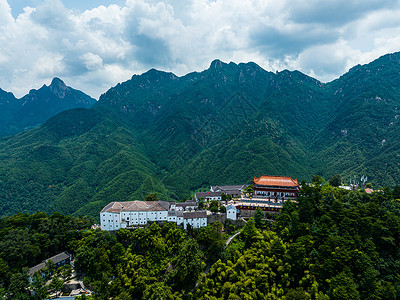
Chizhou Jiuhuashan Baisuigong.
In summary, Baisuigong is not only a place of worship but also a cultural landmark that encapsulates the essence of Buddhist tradition, stunning architecture, and breathtaking natural beauty. Whether you are seeking spiritual solace or an appreciation for historical architecture, a visit to Baisuigong in Jiuhua Mountain promises to be a memorable experience.
Planning Your Visit: A Practical Guide
Practical Guide to Chizhou Jiuhuashan Baisuigong (九华山百岁宫)
Visiting Chizhou Jiuhuashan Baisuigong offers a unique blend of cultural immersion and natural beauty, making it an essential stop for anyone traveling to Anhui Province. This practical guide will help you navigate your journey, ensuring a rewarding experience at this significant Buddhist site.
Getting There
By Air: The nearest airport is Chizhou Jiuhuashan Airport, approximately 30 kilometers from the Baisuigong area. From the airport, you can take a bus or taxi to reach the site.
By Train: High-speed trains are available to both Chizhou Station and Tongling North Station. From either station, local buses or taxis can take you to Jiuhuashan, with a travel time of about one hour.
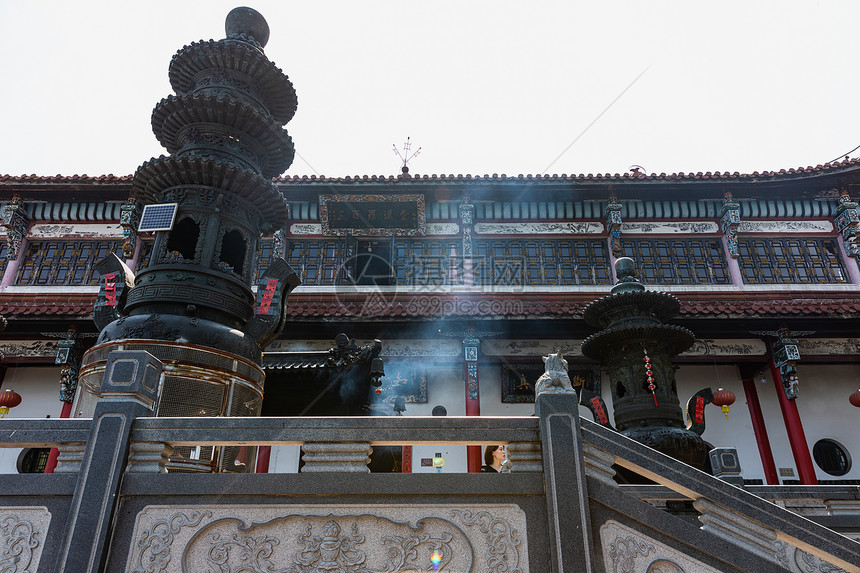
Chizhou Jiuhuashan Baisuigong.
By Car: If you’re driving from cities like Hefei or Nanjing, you can take the G3 Beijing-Taipei Expressway or the G50 Shanghai-Chongqing Expressway. There are parking facilities available at the scenic area.
Key Attractions
-
Baisuigong (百岁宫): This historic temple, built in the Ming Dynasty, is dedicated to the revered monk, Wuxia, who lived to be 126 years old. Explore its unique architecture and serene ambiance, and don’t miss the chance to view the monk’s incorrupt body, a significant aspect of the site’s spiritual allure.
-
Tiantai Temple: Located at the peak of Jiuhua Mountain, this temple is known for its stunning views and ancient architecture. The ascent to the temple is an excellent opportunity for photography and meditation.
-
Huacheng Temple: As the founding temple of Jiuhua Mountain, Huacheng Temple houses numerous Buddhist relics and is a must-visit for understanding the region’s rich Buddhist culture.
-
Shengsi Temple: This temple is another important site on Jiuhua Mountain, offering insight into the local religious practices and stunning mountain scenery.
-
Naturally Beautiful Areas: The surrounding landscapes include picturesque hiking trails, blooming azaleas in spring, and vibrant autumn leaves, making it perfect for nature lovers.
Accommodation
-
Jiuhuashan Town: This area has a variety of accommodation options, from budget hotels to upscale resorts. It’s the most convenient location for accessing the main attractions.
-
Monastery Stays: Some temples offer lodging for those seeking a deeper experience of Buddhist culture. Reservations are recommended.
Dining Recommendations
-
Vegetarian Cuisine: Jiuhuashan is famous for its vegetarian dishes. Don’t miss trying the local specialties such as vegetarian chicken and duck.
-
Local Snacks: Sample local treats like the crispy potstickers and nourishing chicken soup made with local mushrooms, especially after a long day of hiking.
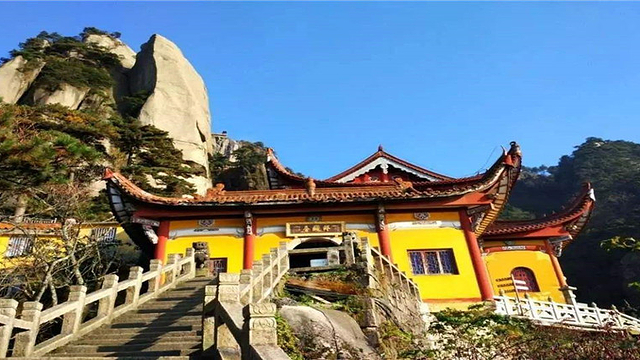
Chizhou Jiuhuashan Baisuigong.
Important Tips
-
Dress Appropriately: As Jiuhuashan is a sacred site, dress modestly. Comfortable shoes are recommended for walking and hiking.
-
Respect Local Customs: Maintain a quiet demeanor in temples and during prayers. Observing local customs enhances your experience and respects the spiritual significance of the area.
-
Stay Hydrated: Bring water and snacks, especially if you plan on hiking. The weather can change quickly, and staying prepared is key.
-
Plan Your Visit: Allocate 2-3 hours to explore Baisuigong. For a more thorough experience, consider spending a day visiting multiple temples and enjoying the natural beauty.
-
Best Time to Visit: Spring and autumn are ideal due to the pleasant weather. The summer months can be hot, while winter offers a unique, tranquil atmosphere but requires warmer clothing.
Sample Itinerary
One-Day Visit:
– Morning: Arrive at Baisuigong, explore the temple, and view the monk’s body.
– Afternoon: Visit Huacheng Temple and Tiantai Temple for breathtaking views.
– Evening: Enjoy a vegetarian meal in town and take a leisurely stroll through Jiuhuashan.
Two-Day Visit:
– Day 1: Visit Baisuigong and nearby temples, stay overnight in Jiuhuashan Town.
– Day 2: Hike to the top of Tiantai Peak and explore the natural areas surrounding Jiuhuashan.
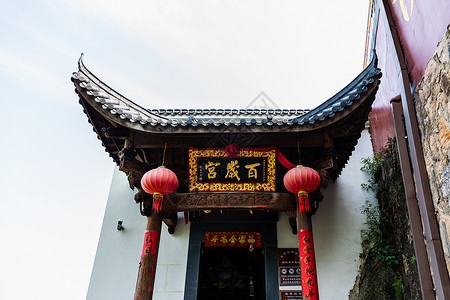
Chizhou Jiuhuashan Baisuigong.
This practical guide aims to help you make the most of your visit to Chizhou Jiuhuashan Baisuigong, providing insights into transportation, attractions, accommodations, and local culture. Enjoy your journey into this serene and sacred part of Anhui Province!
Tickets, Hours, and Booking
When planning your visit to Chizhou Jiuhuashan Baisuigong (百岁宫), it’s important to be aware of the ticketing details to ensure a smooth experience. Here’s what you need to know:
Ticket Prices
- Peak Season (March 16 – November 15):
- General admission: ¥160 per person
- Off-Peak Season (November 16 – March 15):
- General admission: ¥140 per person
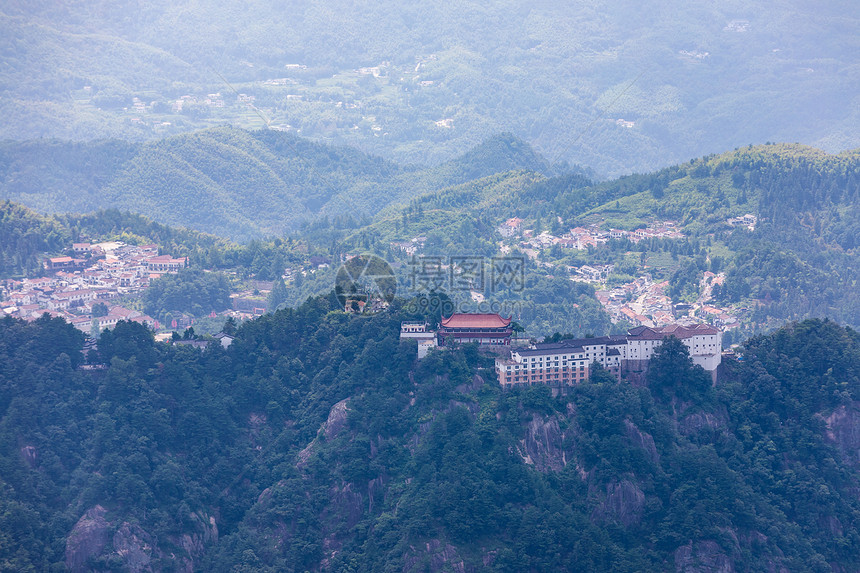
Chizhou Jiuhuashan Baisuigong.
Transportation Tickets
- Internal Shuttle Bus:
- A shuttle bus service is available within the scenic area, costing ¥50 for a round trip. This is essential for convenient access between major attractions.
Cable Car Prices
If you’re looking to elevate your experience with breathtaking views, consider using the cable cars:
– Baisuigong Cable Car:
– One-way fare: ¥55 per person
– Tiantai Cable Car (天台):
– One-way fare: ¥85 per person
– Hua Tai Cable Car (花台):
– One-way fare: ¥85 per person
Opening Hours
- Baisuigong: Open daily from 6:00 AM to 5:00 PM
- Other attractions within Jiuhuashan may have varying hours, so it’s wise to check in advance.
Purchasing Tickets
Tickets can be purchased at the entrance of Jiuhuashan or through various online platforms. For convenience, it’s recommended to buy tickets in advance during peak travel seasons to avoid long lines.
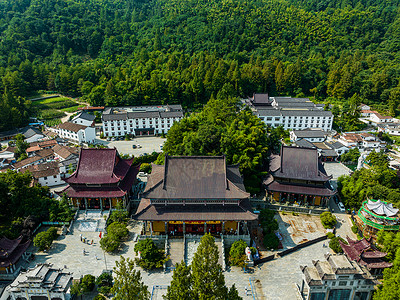
Chizhou Jiuhuashan Baisuigong.
Important Notes
- Ensure you keep your ticket accessible, as it may be required for re-entry or when using shuttle services.
- Respect local customs and regulations while visiting, especially in religious areas.
By being aware of these ticketing details, you can enjoy a hassle-free visit to the serene and culturally rich environment of Baisuigong and the surrounding Jiuhuashan area.
How to Get There
Traveling to Chizhou Jiuhuashan Baisuigong, a revered Buddhist site nestled in the picturesque landscape of Anhui Province, is an experience enhanced by its accessibility. Here’s a comprehensive guide on how to get there and navigate the area.
Getting There
By Air
The nearest airport is Chizhou Jiuhuashan Airport, located approximately 30 kilometers from the scenic area. Regular flights connect this airport to major cities such as Shanghai and Beijing. Upon arrival, you can easily take a taxi or a shuttle bus to Jiuhuashan, which typically takes about 30 minutes.
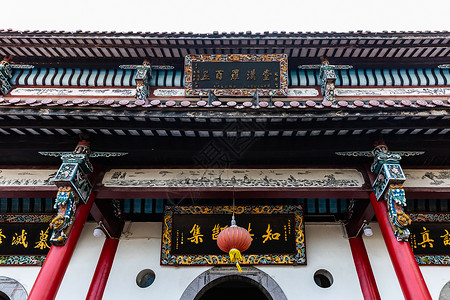
Chizhou Jiuhuashan Baisuigong.
By Train
For those traveling by rail, the Chizhou Railway Station is the closest, situated about 40 kilometers from Jiuhuashan. High-speed trains from major cities like Hefei and Nanjing frequently arrive here. From the station, you can catch a local bus or take a taxi to reach Jiuhuashan in about an hour.
By Bus
Long-distance buses are available from various nearby cities directly to Jiuhuashan. The journey from the city center of Chizhou to Jiuhuashan is roughly an hour, with tickets costing around 12 RMB. Buses run regularly throughout the day, making this a convenient option for travelers.
By Car
If you prefer driving, Jiuhuashan is easily accessible via the G3 Beijing-Taipei Expressway or the G50 Shanghai-Chongqing Expressway. There are ample parking facilities available at the scenic area, ensuring a hassle-free experience for those traveling by car.
Local Transportation
Once you arrive at Jiuhuashan, getting around the area is straightforward:
Shuttle Buses
Within the Jiuhuashan scenic area, there are dedicated shuttle buses that connect the main attractions, including Baisuigong, Tian Tai Temple, and Huacheng Temple. These buses operate frequently, making it easy to explore the various sites without the need for extensive walking.
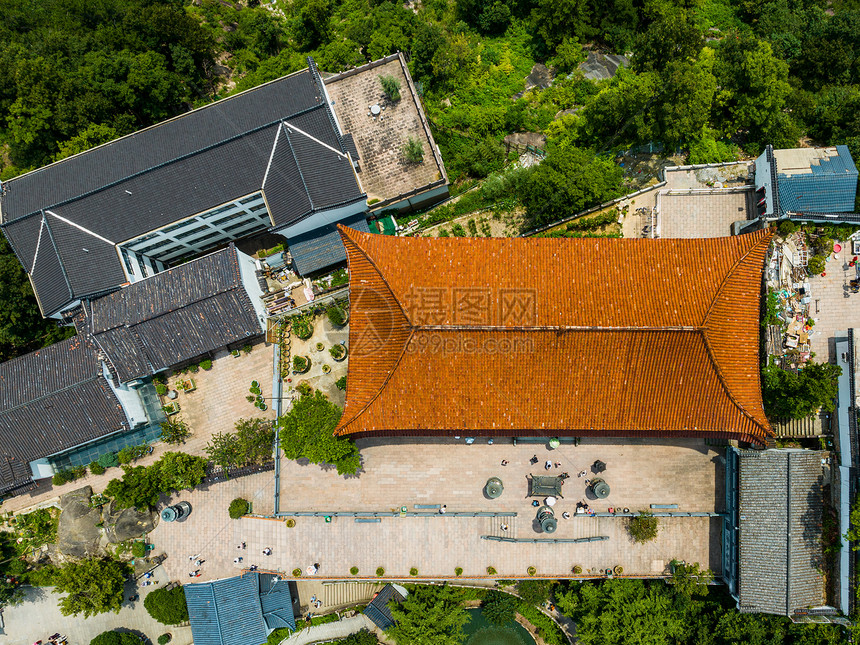
Chizhou Jiuhuashan Baisuigong.
Cable Cars
For those looking to save energy while enjoying breathtaking views, cable cars are available to transport visitors to higher elevations like Tian Tai Peak. The ride offers stunning panoramas of the surrounding mountains and valleys, enhancing your overall experience.
Walking
While local transportation is convenient, many visitors enjoy walking between the temples and scenic spots, as this allows for a more intimate experience with the natural beauty and spiritual atmosphere of Jiuhuashan. Comfortable walking shoes are recommended due to the varying terrain.
Travel Tips
- Timing: Plan your travel during off-peak hours if possible to avoid crowds, especially on weekends and holidays.
- Tickets: Purchase entrance tickets in advance when possible, especially during peak tourist seasons.
- Local Guidance: Consider hiring a local guide for a more enriching experience, as they can provide insights into the historical and cultural significance of the sites.
With its rich spiritual heritage and stunning natural beauty, Jiuhuashan Baisuigong is not just a destination; it’s a journey into tranquility and reflection. Enjoy your visit!
Local Cuisine and Accommodation
When visiting Chizhou Jiuhuashan Baisuigong, you’ll find yourself immersed not only in the stunning natural landscapes and rich cultural heritage but also in a delightful culinary scene and a variety of accommodation options.
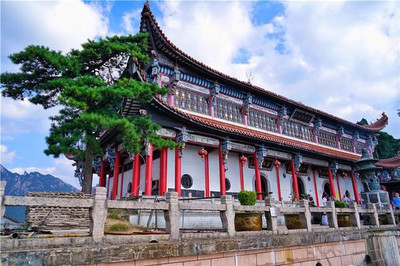
Chizhou Jiuhuashan Baisuigong.
Culinary Delights
1. Jiuhua Vegetarian Cuisine:
Jiuhua Mountain is renowned for its vegetarian dishes, which are not only flavorful but also aligned with Buddhist dietary customs. Be sure to try the vegetarian chicken, duck, and ham, which are prepared with local ingredients and offer a unique twist on traditional dishes. A must-visit spot for this is Jiuhua Mountain Vegetarian Restaurant, where you can indulge in a buffet of these delectable offerings.
2. Qingyang Potstickers:
For those looking to explore local snacks, Qingyang potstickers are a delightful treat. These crispy-skinned dumplings are filled with savory meat and vegetables, making them a perfect snack or light meal while you explore the area.
3. Stone Ear Chicken Soup:
Another local specialty is the Stone Ear Chicken Soup, made with the unique stone ear mushrooms found in the region. This nourishing dish is ideal after a day of hiking and offers a comforting and restorative experience.
Where to Stay
1. Jiuhua Street:
This is the primary accommodation area close to the scenic sites. Here, you’ll find a range of hotels and guesthouses catering to all budgets, from economical options to more luxurious stays. Popular choices include the Julong Hotel and Anxiang International Hotel, both known for their comfortable amenities and convenient access to attractions.
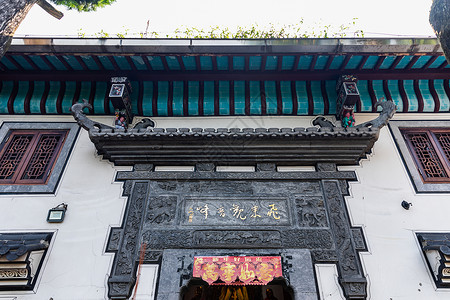
Chizhou Jiuhuashan Baisuigong.
2. Mountain Temples:
For a truly immersive experience, some temples on Jiuhua Mountain offer accommodation. Staying in a temple allows you to connect deeply with the local culture and spirituality. Reservations are usually required in advance, so plan accordingly.
3. Qiyang County:
If you prefer to stay in a more urban setting, the town of Qiyang, located at the foot of Jiuhua Mountain, offers budget-friendly accommodations. While it may require daily commutes to the mountain, the lower prices make it a viable option for budget travelers.
Tips for Dining and Lodging
- Respect Local Customs: When dining at vegetarian restaurants, be aware of the local customs and dining etiquette, particularly in Buddhist settings.
- Advance Reservations: Especially during peak seasons, accommodation in temples can fill up quickly, so make your reservations as early as possible.
- Explore Local Markets: Don’t hesitate to visit local markets for snacks and souvenirs. They offer a vibrant glimpse into the local culture and are perfect for picking up unique food items to take home.
With these culinary delights and accommodation options, your visit to Chizhou Jiuhuashan Baisuigong will be both fulfilling and memorable. Enjoy the serene environment, delicious local flavors, and comfortable stays as you explore this beautiful region!
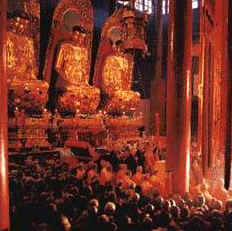
Chizhou Jiuhuashan Baisuigong.
Frequently Asked Questions
-
What is the historical significance of Baisuigong?
Baisuigong, or the Palace of Longevity, is a revered Buddhist site built during the Ming Dynasty. It is dedicated to the remains of the monk Wuxia, who lived to be 126 years old and is celebrated for his teachings and spiritual presence. -
How do I get to Baisuigong?
The nearest airport is Chizhou Jiuhuashan Airport, approximately 30 kilometers away. You can take a bus or taxi from the airport. Alternatively, take a high-speed train to Chizhou Station or Tongling North Station, followed by a bus or taxi to the site. -
What are the opening hours for Baisuigong?
Baisuigong is open daily from 6:00 AM to 5:00 PM, allowing visitors ample time to explore its historical and cultural offerings. -
How much does it cost to visit Baisuigong?
The entrance fee for Baisuigong is part of the overall Jiuhuashan scenic area ticket, which costs approximately 160 RMB during peak season and 140 RMB during the off-peak season. -
How long should I plan to spend at Baisuigong?
A visit to Baisuigong typically requires 2 to 3 hours. This duration allows time to appreciate the architecture, explore the surrounding natural beauty, and reflect in this tranquil setting. -
Are there accommodations available near Baisuigong?
Yes, there are various lodging options ranging from budget hostels to mid-range hotels in Jiuhuashan area. For a unique experience, some temples offer accommodations, allowing you to immerse yourself in the local Buddhist culture. -
What should I wear when visiting Baisuigong?
Given the elevated terrain and varying temperatures, it is advisable to wear comfortable footwear suitable for walking and to dress in layers. A light jacket or sweater for the cooler morning and evening temperatures is recommended. -
Are there any dining options nearby?
Yes, you can find several restaurants and eateries offering local vegetarian cuisine, particularly the famous Jiuhua vegetarian dishes. Be sure to try dishes like vegetarian chicken or duck during your visit for an authentic experience.
Final Thoughts on Your Trip
Visiting Chizhou’s Jiuhuashan Baisuigong offers a unique blend of spiritual reflection and natural beauty that captures the hearts of travelers from around the globe. As you explore this revered site, you’ll find yourself immersed in the rich tapestry of Buddhist culture, surrounded by awe-inspiring landscapes that evoke a sense of tranquility and peace.
Whether you are drawn here for pilgrimage, a love of nature, or simply to soak in the serenity, Baisuigong stands as a testament to the enduring human spirit and the quest for enlightenment. The stories of the ancient monks and the breathtaking views from the mountain peaks offer a profound experience that resonates deeply within.
Allow this sacred place to rejuvenate your spirit and inspire your journey. As you walk the paths once tread by the wise, take a moment to pause, reflect, and appreciate the beauty that surrounds you. Your visit to Jiuhuashan Baisuigong will not only enrich your understanding of Buddhist traditions but also provide lasting memories of a place where heaven meets earth. Embrace the opportunity, and let the mountain speak to your soul.
